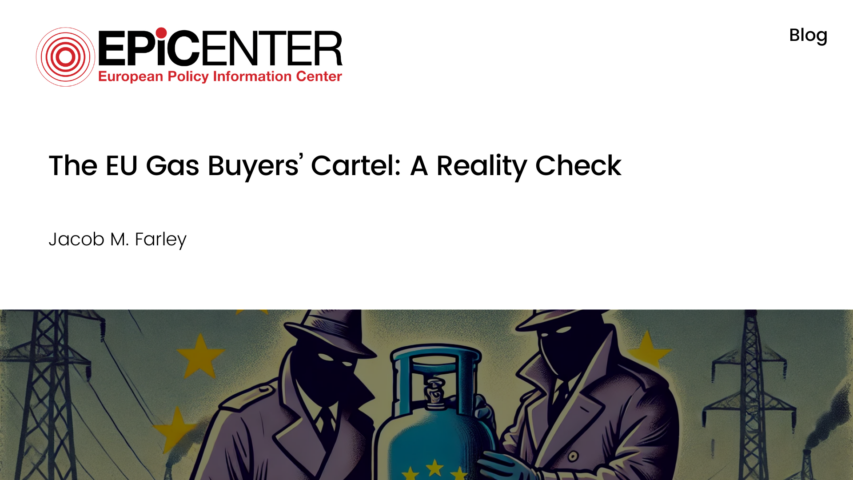The EU Gas Buyers’ Cartel: A Reality Check

The EU Gas Buyers’ Cartel: a Reality Check
Jacob M. Farley // 26 January 2023
Since its geopolitical turn, the European Commission has time and again reiterated the need for member states to level up the EU’s autonomous security and defence capabilities. The cut-off of Russia, following its invasion of Ukraine has led to high gas prices and inflationary pressures, making energy a crucial issue in security discussions. As a result, the idea of the Energy Union has been expanded. This idea has existed for a long time, and was famously backed by the then-prime minister of Poland, Donald Tusk, last decade. The Commission would use the collective strength of member states during negotiations with potential suppliers. The underlying belief is that better prices will follow, as the EU’s demand – a sizeable portion of the global market – would be vested in a single entity.
Despite how attractive the idea might seem, there are two main reasons why a gas buyers’ cartel is ultimately unfeasible. Firstly, natural gas poses several significant challenges that the Commission’s last joint venture, the COVID-19 vaccination purchase, did not. Secondly, even that venture was not an indisputable success.
Collectively, the EU makes up a sizeable portion of the global demand for natural gas. As a result, each statement from Brussels regarding gas imports affects market prices. This was demonstrated in early 2022, when prices soared from €70 to €210 per megawatt-hour (MWh) after the Commission told members to bring storage levels to 90 per cent capacity by winter. After backtracking, prices fell to €108/MWh. By virtue of its market position, the EU must remain mindful of the impact its behaviour has on the price of the very commodity it wants to make cheaper. This should not come as a surprise to policymakers. Price distortion is a common effect resulting from heavy-handed state interference in the free-market process or even the threat of it. Likewise, should the EU demand price reductions, many of the LNG vessels currently floating off the Spanish coast would sail elsewhere once Europe loses its price premium. This could limit the efficacy of several member states’ investments in floating import terminals to expand their LNG import capacity by 2023. Pursuing the market intervention strategy will exacerbate the crisis in the short term and incentivise suppliers to sell to other, better-paying customers instead of the EU.
Because many member states continue to restrict methods of domestic natural gas extraction, imports remain vital for European economies to function. It is absurd that the EU continues to side-line domestic gas production as a means to resolve a gas shortage, which is a supply-driven problem. Instead, market intervention is paraded as a panacea to the EU’s energy woes. In practice, the EU would remain as dependent on market suppliers as before, only now, it would lecture them for profiteering during a crisis, echoing the naïve policymaking that made the EU reliant upon Russia in the first place.
Further, there are few specific details surrounding what an EU body charged with running the scheme would look like. However, the EU would surely struggle to coordinate the purchase and distribution of gas for member states whose energy mixes, storage, and import facilities vary significantly. Handing responsibility to a Commission body to allocate supplies and calculate final costs, which will vary between countries due to LNG processing and pipeline transit costs, comes at great risk. A draft proposal suggests that a ‘service provider’ would handle operations. However, specific details are sparse. The draft indicates that gas companies throughout the EU would inform the body of what they require through an online tool. The proposal represents a complete reversal of the EU’s market-oriented agenda in the energy sector, replacing it with a vast government monopoly, one that is likely to fall victim to chronic inefficiency through poor decision-making by overburdened bureaucrats. A poorly run joint purchasing scheme would devastate the EU-27’s future growth prospects, making a bad situation even worse.
Many support the joint gas purchasing scheme by pointing at the success of a similar endeavour during the COVID-19 pandemic. So it is worth recalling how member states handed the power to the Commission to purchase vaccines on their behalf and what the results were. Proponents claim that cheaper prices, thorough accountability for suppliers, and Union-wide coverage made it an overwhelming success. However, the price of solidarity was high. The EU’s vaccine rollout was slower than several of its neighbours at a time when every delay allowed more preventable deaths to occur. Post-Brexit Britain, by comparison, used its manoeuvrability to quickly strike unilateral deals with suppliers. Consequently, Britain soon outnumbered every EU country in the number of jabs administered. The EU’s joint purchasing mission succeeded in securing vaccines; however, clear trade-offs to the collective approach should not be ignored. Especially if the EU wishes to repeat the method with natural gas, a qualitatively different product.
Coming up with creative ways to protect the EU’s energy supplies at a moment of vulnerability is understandable. However, it is wrong to pursue a hastily devised market-intervention strategy that is unlikely to offer either an immediate remedy to Europe’s energy insecurity or a jolt to members’ economic malaise. While forecasts remain bleak for the coming years, the EU should refrain from pre-emptively burning down the house in a state of panic.
EPICENTER publications and contributions from our member think tanks are designed to promote the discussion of economic issues and the role of markets in solving economic and social problems. As with all EPICENTER publications, the views expressed here are those of the author and not EPICENTER or its member think tanks (which have no corporate view).



